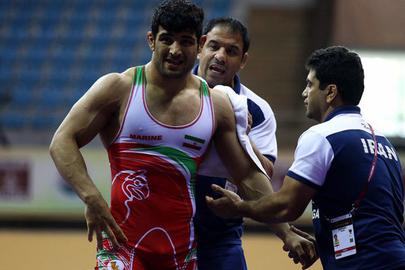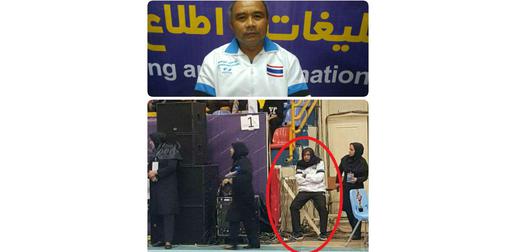The following article was written by an Iranian citizen journalist on the ground inside the country, who writes under a pseudonym to protect his identity.
During the Wrestling Under-23s World Championship, hosted by Poland from November 21 to November 26, Iranian freestyle wrestler Alireza Karimi’s coach had some very strange words of encouragement. As Karimi was wrestling, the coach stood close to the mat and shouted out: “Lose, Alireza! You must lose. Do not win, Alireza!”
It must be unprecedented in the history of sports for a coach to call out such enthusiastic encouragement for one of his mentees to lose. An athlete who had already won a world-class bronze medal might naturally expect the full support of his coach and his country, and for Iranian officials and fans alike to cheer him on to win. And yet, this was not the case.
When Karimi’s coach Alireza Rezaei instructed him to lose, Karimi was just about to beat his Russian opponent Alikhan Zhabrailov. His coach had been informed that if Karimi won, his next match would be against the Israeli wrestler Uri Kalashnikov — and competing against an Israeli athlete is a red line that Iranian athletes are not even allowed to think about crossing.
Alireza Karimi is 23, and was born on March 21, 1994 in Karaj near Tehran. He won two gold medals at the Asian Wrestling Championships and a bronze medal at the 2015 World Championships. On May 14, as he was stepping down from his championship stand at the Asian games, he announced: “I will not rest until I get the Olympics and the world wrestling gold.”
Karimi competes in the 86kg weight division, and since Iranian athletes have traditionally done well in this weight group, it holds a special place in Iranian freestyle wrestling. Besides Karimi, there is Hassan Yazdani, who won the gold medal at the 2016 Rio Olympics, and Ezzatolah Akbari, whose silver medal at the 2013 World Wrestling Championships returned Iran to the championship level after 12 years.
And recently, Alireza Karimi was so close to getting his wish at the World Championship.
The ban on competing with Israeli athletes, imposed after the 1979 Islamic Revolution, is a taboo that few Iranian athletes have dared to break, and when they do, they are harshly punished for it. Islamic Republic officials have claimed that this ban is their way of defending “the oppressed people of Palestine” — while Palestinians themselves have implemented no such ban. In fact, throughout the years, Palestinian and Israeli athletes have regularly competed against one another in a range of sporting events. And when the Palestinian Football Team participated in the Asian Cup Games for the first time in 2015, five of its footballers were Israeli Arabs.
Lose to “Wipe Israel Out”
It’s this legacy of taboos that forced Karimi’s coach Alireza Rezaei to shout at him to lose while he was on the mat, even though he had been practicing hard and dieting for the last six months.
Alireza Rezaei is a former wrestler and the former director of Iran’s National Freestyle Wrestling Team. In the summer of 2016, during a rally on the occasion of Iran’s anti-Israeli Qods Day, he told reporters, “I am a member of the ‘Wipe Israel Out’ campaign. We want all members of Iran’s National Wrestling Team to join the campaign.”
But Rezaei’s activism aside, his instructions to Karimi were logical. By telling him to lose, he hoped to keep Karimi’s chance to win the bronze medal alive. Because if Karimi had beaten his Russian opponent and had refused to fight his Israeli opponent, not only would he be disqualified from winning any medals, but the whole Iranian team could have been eliminated from the competition.
Prior to 2006, Iranian officials were proud to broadcast their ban on competing against Israeli athletes. But the situation changed that year, when the International Olympics Committee (IOC) updated the Olympic charter, making it clear that if an athlete refused to compete against other athletes on political, religious, racial or ethnic grounds, that athlete would be banned from international competitions. Furthermore, the federation or the Olympics committee of that country would be fined and/or be banned from competitions.
Nowadays, Iranian athletes are forced to lose or fake injury to get out of competing against Israelis. But there are other complications too. If an Iranian athlete and an Israeli athletes both win medals, it is customary to appear together on the victory stands, a scenario bound to anger the Islamic Republic. During the 2016 International Shooting World Cup competitions in Baku, Azerbaijan, in which teams from 80 countries participated, Iranian athlete Hossein Bagheri won a silver in the Men’s 10m Air Rifle, the first Iranian medal in the competitions. But when a photograph of him standing next to the Israeli bronze medalist Sergey Richter was published, the Young Journalists Club, part of Islamic Republic of Iran Broadcasting (IRIB), referred to the win as “a medal that smells of blood.” On his return to Iran, not only did Bagheri receive no thanks or celebratory welcome, he was summoned for questioning.
As it happened in the case of Karimi, the Russian wrestler beat the Israeli athlete. Had Karimi won, he would have had to appear standing next to the Israeli wrestler. The Iranian national team announced that Karimi had been injured and could not compete against Israeli Uri Kalashnikov.
However, the Iranian Students News Agency (ISNA) told the story as it happened [Persian link]: “Karimi deserved to win against his Russian competitor, but to avoid facing an Israeli competitor in the second round he lost in the final seconds despite being ahead of his Russian opponent...When the Russian wrestler got in the finals, Karimi was again in a situation where he had to compete against [the Israeli wrestler] but it did not happen because Karimi dropped out.”
Karimi also gave an interview to ISNA. “I was told that the Israeli wrestler defeated his American rival, and that I must lose to avoid facing an Israeli opponent,” he said [Persian link]. “I have trained hard for months to win a gold medal, and it would have been easy for me to win.”
What About Injustice Against Athletes?
Karimi described his frustration over the ordeal to ISNA. “I do accept that Israel is an oppressor and commits crimes,” he said. “But would it not be oppression if our authorities undermine my hard work again?”
After the event, Karimi posted a moving video on his Instagram page. In the video, he is walking at night along rain-swept streets in the Polish town of Bydgoszcz, listening to a gloomy Iranian song. The caption to the video reads: “Silence is the last fortress; you can never take away our rights.”
A video of the match, recorded by one of the Iranian team’s coach in the closing minutes of the match, has been shared on social media. Twitter and Instagram have been inundated with expressions of sympathy for Karimi, many using the hashtags “#lose_alireza”, and “#you_must_lose,” and expressing fury at Rezaei, who many say dashed the hopes of a 23-year-old young man. And they acknowledged that the coach was not the only one; there were many more people like him in Iran. “This was a sign for us to see the dirty people behind the curtain of his defeat,” posted one person on Twitter. “We needed to see how the dirty politics of a group of dirty people caused your efforts to be blown away with the wind.”
Before this latest scandal, the most recent athletes to fall victim to the Islamic Republic’s anti-Israeli policy in sports were the two footballers Masoud Shojaei and Ehsan Hajsafi. In August, they played for the Greek team Panionios against Maccabi Tel Aviv. They faced harsh criticism from Iranian officials.
It’s highly unlikely that Alireza Karimi will be the last victim. In fact, by praising Karimi’s recent defeat at the World Championships, the Islamic Republic has essentially doubled down on its policy, and suggested that Karimi should be proud of his support of it — albeit forced. “Your noble and heroic action in the world competition in Poland, abandoning the medal and the podium in support of the highest human values, is a source of pride and praise,” said an official statement posted on the website of Iran’s Ministry of Sport.
Shahriar Nekoozad, Citizen journalist
visit the accountability section
In this section of Iran Wire, you can contact the officials and launch your campaign for various problems

























comments